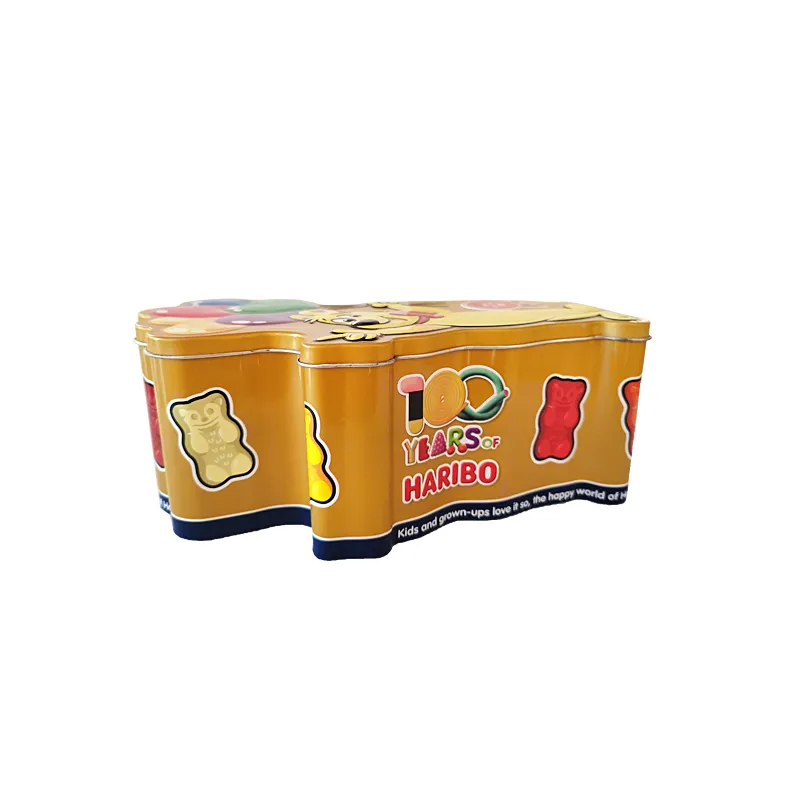Biscuits are a common snack food with a crispy taste, fragile and afraid of moisture. When people buy or make biscuits, they often focus on their freshness and taste, and packaging plays an important role in this. In recent years, tin plate cans have become increasingly popular as packaging materials for biscuits, but can they really effectively keep biscuits fresh?
This article will explore this issue in depth from the material characteristics, sealing, moisture resistance and other aspects of tinplate cans, revealing the actual effect of tinplate cans as biscuit packaging.

What is a tinplate can? Why choose it for biscuit packaging?
What are the material characteristics of tinplate cans?
The core material of tin plate cans is tinplate, that is, a layer of tin is plated on a thin steel plate. This layer of tin not only increases the corrosion resistance of the material, but also enhances its mechanical strength, making it suitable for food packaging. In addition, tinplate has good ductility and strong processability, making it easy to design into cans of various shapes. This material has a high hardness and can effectively protect the biscuits in the can from external physical damage such as extrusion and crushing.
Why is tinplate suitable for biscuit packaging?
The application of tinplate cans in biscuit packaging benefits from its excellent moisture-proof and anti-oxidation properties. Since biscuits are a kind of food that is sensitive to moisture, the sealing characteristics of tinplate cans enable them to effectively block moisture in the air and reduce the softening and loss of taste of biscuits due to moisture absorption. At the same time, the texture and appearance of tinplate cans are also suitable for gift box packaging, making biscuits appear more upscale.
How is the sealing performance of tinplate cans? Can it really block air?
Can tinplate cans completely isolate air?
The sealing performance of tinplate cans mainly depends on the design of its lid and the sealing of the material. Usually, high-quality tinplate cans are equipped with tightly fitting lids or sealing strips with rubber rings, which can greatly reduce the entry of air. However, it should be noted that tinplate cans are not vacuum packaging, and their sealing can only reduce the entry of air to a certain extent, but cannot completely block it. In this way, although the biscuits can remain dry and fresh for a long time, they will gradually lose some of their taste due to the entry of a small amount of air after long-term storage.
Is the sealing design of tinplate cans consistent?
Not all tinplate cans are equally airtight. Tin plate cans on the market have different sealing designs depending on their use and price. Some high-end biscuit cans use double-layer sealing lids and even come with sealing rings to enhance the sealing effect. Low-priced tin plate cans may have simpler lid designs, which reduce the airtightness. Therefore, choosing a tinplate can with a high-quality sealing design is essential to keep the biscuits fresh.

How is the moisture-proof performance of tinplate cans? Can it completely prevent biscuits from getting wet?
Can tinplate cans isolate moisture?
Biscuits tend to soften due to moisture, and the material and structural design of tinplate cans can reduce moisture penetration to a certain extent. The tin coating not only prevents corrosion, but also blocks some moisture, slowing down the effect of moisture on the biscuits in the can. However, tinplate cans are not completely moisture-proof packaging materials. Moisture will still gradually penetrate into the can in extremely high humidity environments, especially when the can mouth is not sealed tightly or stored for too long. Therefore, although tinplate cans can keep biscuits dry well in normal humidity environments, they still need to be used with desiccants in humid environments to achieve better moisture-proof effects.
How does the moisture-proof effect of tinplate cans compare?
Compared with plastic packaging, tinplate cans have a more ideal moisture-proof effect, especially when the sealing design is more reasonable. Plastic bags or plastic cans are prone to moisture infiltration due to the air permeability of the material, while tin plate cans perform better in this regard due to the physical properties of metal. Therefore, if biscuits need to be stored for a long time, especially in a high humidity environment, tin plate cans are often more advantageous than plastic packaging.
How much effect does tinplate cans have on the taste protection of biscuits?
Can tinplate cans keep the crisp taste of biscuits?
The crisp taste of biscuits depends largely on their dryness. Tinplate cans can effectively delay the process of biscuits softening due to moisture or oxidation due to their excellent moisture-proof and anti-oxidation properties. Under normal circumstances, tinplate cans with better sealing can maintain the crisp taste of biscuits for several months, especially when desiccant is added, this effect is more significant.
How effective is the oxidation protection of tinplate cans?
Oxidation is another important factor in the deterioration of biscuits. When the oil in biscuits is exposed to oxygen in the air, oxidation reactions easily occur, resulting in astringent taste and reduced aroma of the biscuits. The material and structure of tinplate cans can reduce the infiltration of oxygen, thereby extending the shelf life of biscuits. However, it should be noted that the oxidation process will proceed slowly even in the presence of a small amount of oxygen, so biscuits cannot remain fresh indefinitely in tinplate cans.

How does tinplate cans affect the storage time of biscuits?
What are the advantages of tinplate cans in terms of storage time?
Tinplate cans are considered to be more suitable for long-term storage of biscuits than general plastic bags or paper packaging due to their sealing and moisture-proof properties. For many biscuit manufacturers, the use of tin plate cans for packaging can keep the taste and quality of the product unopened for more than half a year. Therefore, tin plate cans are particularly suitable for biscuit products that require a longer shelf life, which is one of the reasons why they are popular in the market.
How much does the storage environment affect tinplate cans?
Although tin plate cans can isolate air and moisture to a certain extent, the storage environment still has an important impact on their effectiveness. If the tinplate can is placed in a high temperature and humid environment for a long time, its sealing and moisture-proof properties will gradually decrease. Therefore, it is recommended to store the tinplate can in a dry and cool place to maximize the freshness of the biscuits in the can.
How much does the anti-corrosion performance of the tinplate can affect the freshness of the biscuits?
How does the anti-corrosion performance affect the freshness of the biscuits in the can?
The tin plating of the tinplate can not only has an anti-corrosion effect, but also prevents the metal from directly contacting the biscuits and preventing their taste from being affected. During the storage process, if the can body is corroded, the sealing inside the can will be affected, thereby accelerating the deterioration of the biscuits. Therefore, tin plate cans with better anti-corrosion performance can usually better keep the biscuits fresh and crispy.
Does the anti-corrosion coating help prevent biscuits from deteriorating?
The inner wall of the tinplate can is often coated with a food-grade coating to prevent the metal in the can from directly contacting the biscuits. This coating not only has an anti-corrosion effect, but also further improves the anti-oxidation and anti-moisture properties of the can body. Therefore, the application of anti-corrosion coating plays a positive role in ensuring the taste and freshness of biscuits.

Will the sealing of tinplate cans be damaged during use?
Will repeated opening and closing affect the sealing effect of tinplate cans?
After repeated opening and closing, the sealing of the lid of a tinplate can may gradually weaken. Although some high-quality tin plate cans are designed with this problem in mind, repeated opening and closing may still cause the lid to fit the can body less tightly, making it easier for air and moisture to penetrate into the can. Therefore, in order to maintain the taste and freshness of the biscuits as much as possible, consumers are advised to minimize the time the can body is exposed to the air after opening the can.
Will the deformation of the can body affect the sealing effect?
If the tinplate can is deformed by external forces such as squeezing and collision during use or transportation, its sealing will be significantly affected. The deformed can body may prevent the lid from closing completely, causing air to enter the can and affect the preservation effect of the biscuits. Therefore, when purchasing and using tin plate cans, care should be taken to avoid physical damage to them.

